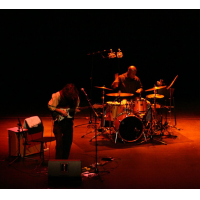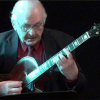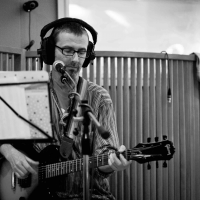Home » Jazz Musicians » Trevor Warren
Trevor Warren
Trevor has been playing guitar since 1982, largely self taught, exploring rock, jazz, world and folk idioms. Currently preparing the release of a collaborative album with Count Dubulah (aka Nick Page - Transglobal Underground etc.) In 2012 he travelled to Kenya to record and produce the album Kodhi together with Kenyan musician Ayub Ogada (1956-2019). Kodhi was released on Long Tale Records in 2015. Ayub Ogada's final album, Omera, was released in 2022 on Long Tale. Founder and bandleader of jazz rock band DISASSEMBLER and the world jazz DEVA. Winner best foreign band award with Dissasembler in the Granada Jazz festival 2009. In 1997 he worked with Indian percussion master Balachandar. In 1994 he co-wrote and performed music for dance/theatre project Company Skin in the acclaimed production 'G is for Gorgeous' in London at the ICA and The Place Theatre. Taught jazz by John Etheridge and John Parricelli he also studied Harmony and Composition at Morley College in London. He has played with Mark Lockheart, Annie Whitehead, Winston Clifford, Seb Rochford, Oren Kaplan, Count Dubulah, Theo Travis, Nic France, Richard Dudanski, Paul Weller and many others.
Awards
Disassembler: Winners Granada Festival Jazz Competition (Concurso Internacional de Interpretes de Jazz) Spain 2009
Gear
Trevor Warren plays a hand-crafted Clifton guitar, built by Mo Clifton of London, England.
Tags
Disassembler: What Is
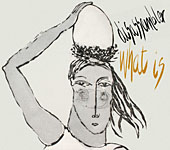
by Chris May
It's a broad church, but British guitarist Trevor Warren's Disassembler comes out of the same genre mashing movement as bands like Acoustic Ladyland, Polar Bear, Led Bib and trioVD. Each has crafted an individual spin on jazz/rock/dance collision, from Acoustic Ladyland's seminal three-minute punk thrashes, extended by Led Bib and trioVD to include more collective and individual improvisation, through Polar Bear's more nuanced excursions.
Though its sound is entirely its own, Disassembler shares certain qualities with Polar Bear. ...
Continue ReadingDisassembler: Fear Is The Mother Of Violence

by Chris May
Disassembler Fear Is The Mother Of Violence 33 Jazz 2008
Led by guitarist and composer Trevor Warren, Disassembler brings together half a dozen outward-looking British jazz musicians in a jazz and post-rock mix with Native American, Albanian and Mongolian flourishes. The adventurous and attractively rough-edged Fear Is The Mother Of Violence is the follow-up to the group's debut, Disassembler, (33 Jazz, 2005), and is shaped conceptually around Warren's disenchantment with the politics ...
Continue ReadingTrevor Warren: Disassembler
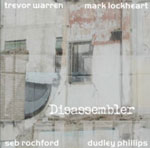
by Chris May
A lyrical and gently trippy album in which Trevor Warren--previously best known as leader of the world/jazz band Deva--brings together free improv, groove, and rock with music from India, the Middle East, and Africa. It whispers rather than shouts, and the prominent access-all-genres presence of saxophonist Mark Lockheart and drummer Seb Rochford gives it something of the flavour of Polar Bear in that group's more reflective moments.
Warren took the title Disassembler from Eric Dexler's book on nanotechnology, ...
Continue ReadingDisassembler's New Album 'what is' out now on jazzcds.co.uk: “Warren's striking themes and rousing arrangements lift it far above the contemporary Euro-jazz throng.” The Guardian “..a jewel of an album..” Allaboutjazz (Jazz Granada) 4 out of 5 John Fordham guardian.co.uk, Thursday 18 March 2010 22.20 GMT Disassembler features the compositions of its guitarist/leader Trevor Warren and the distinctive solo voices of trombonist Annie Whitehead and saxophonist Mark Lockheart. Warren's striking themes and rousing arrangements lift it far above the contemporary Euro-jazz throng
Primary Instrument
Guitar
Willing to teach
Intermediate to advanced

